|

by Tim Ventura
January 1st, 2005
with revision by John Dering
from
AmericanAntigravity Website
Part 1. Nick
Cook’s Mysterious Discovery
During the course of researching his best-selling book, “The Hunt
for Zero Point”, Nick Cook stumbled upon World War II era
evidence for a secret Nazi Weapon that came to be known as the “Nazi
Bell” device. This device was constructed by a scientific team
reporting to SS General Hans Kammler under a veil of secrecy
even deeper than that of the Nazi nuclear research.
|
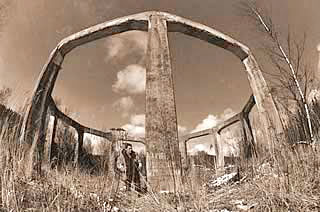
Nazi-Bell:
Closeup of a test-platform at the secret Wenceslas Mine
facility in Poland. |
While Cook’s research yielded
little information about the specific design or application of the
Nazi Bell device, his sources indicated that it apparently
was able create a variety of startling effects on nearby objects.
It has been speculated that the Bell
device was designed to use high-speed counter-rotating
components filled with specialized materials and energized by
electromagnetic energy to induce “torsion” effects and thus control
gravity and other significant effects.
John Dering, a physicist specializing advanced directed
energy, nonlinear electrodynamics and new energy sources has further
reported on a “Rhine Valley” facility and device.
He believes this
to have been an actual wartime prototype deployment of a successor
to the Nazi Bell experiments, which were carried out in the
Wenceslas Mine research lab in occupied Poland.
While the Bell experiment was
focused on developing a radical new propulsion technology,
the little-known Rhine Valley experiment may have been a last-ditch
attempt to weaponize the Bell’s dangerous side effect for use
against Allied forces.
|
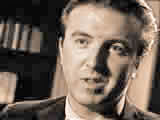
Nick Cook: Janes
Defense Weekly Aviation Editor & investigative author |
Dering speculates that the German
WW-II research was intended to create a powerful propulsion effect
by engineering application of Einstein’s Unified Field Theory
(UFT) equations. Within the 1929 version of the Einstein
UFT equations a linkage is found between the “vector magnetic
potential” and Torsion. Put simply, in the Unified Field Theory
the effects of curved space-time (resulting from a massive body,
like the earth) can locally offset by creating Torsion.
Thus
electromagnetic interactions are harnessed to induce torsion, which
in turn can then null out gravitation.
This astounding possibility for gravity control is not predicted in
either the special or general relativity theories and appears only
in the Unified Field equations. Thus, a sort of counteraction
to gravity or “antigravity” field would be the result.
The heavy-duty concrete construction of the test-rig at the
Wenceslas Mine, complete with heavy steel mounting-rings, bears
witness to the massive scale of the forces that the research
produced.
While the full purpose and results of neither experiment is
completely known, it is obvious that Nazi Bell possessed a
great deal of value in terms of secret-weapons – with a range of
choices at his disposal at the end of World War II, Hans Kammler
considered only the Nazi Bell experiment as being valuable enough to
save Germany from the encroaching Allied & Russian forces.
The
Bell project [whatever its full purpose] was the only research
program in Nazi Germany to carry the designation “War Decisive”.
Not even the German atomic bomb or rocket programs were considered
of such importance!
Historically speaking, the German’s motive for developing the
Nazi Bell device seems apparent. Hitler’s Third Reich had an
almost borderline obsession with secret “wunder” and “uber-weapons”
that they felt would give them an advantage against the Allies.
The
wild success of the V-2 rocket program had emboldened them to
undertake the development of even more esoteric weapons projects –
such as the world’s first jet fighter, the ME-262, and a
series of jet-powered Coanda-Effect UFO prototypes (radical
disk shaped VTOL aircraft designs that proved ultimately
unsuccessful). The most notable of these was a design by Andreas
Epp, which became an inspiration for the later AvroCar
experiments of the 1950’s.
|
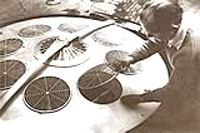
Coanda Effect: A
prototype flying disk design by Andreas Epp. |
Neither the ME-262 nor the
Coanda Effect
disk devices were ready in time for use against
the Allies, but nonetheless received the backing of the Third Reich,
which supplied them with trained scientists, materials and research
funding, and a nearly endless supply of slave-labor with which to
build the projects.
It’s not known where the true inspiration for the Nazi
Bell device & prior Rhine-Valley experiments originated, but its
possible to speculate that they were trying to leap to a completely
electromagnetic propulsion system after realizing the limited
potential in controllability and speed from their experimentation
with the Coanda-Effect saucer technology.
Perhaps some of the more
forward-thinking physicists had the ear of Hans Kammler, and
suggested to him that the time was right to evolve to a technology
so far ahead of aerodynamic propulsion of the day that it would give
Germany absolute
|
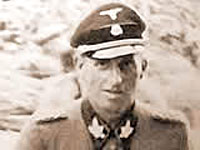
Hans Kammler: A
rare photo of the SS General behind the Bell project. |
supremacy in the air.
Darker
possibilities exist, given that the Bell Device researchers
appeared very interested in the dangerous and lethal side effects
created by exposure to the Bell force field.
Assuming that the Nazi’s had decided on a nearly fictional approach
to directly interacting with gravity through electromagnetism, the
next logical step that they would have taken is to find a scientific
basis to work from.
As scientists, Kammler’s team would have
quickly realized that this scientific support wouldn’t have come
from either Relativity Theory or Quantum Mechanics,
but they wouldn’t have had to search very far, as the Germans had
already reviewed just such a theory to unify Electromagnetism and
Gravitational Forces …
On June 14th, 1928, a paper was published in German that
would have certainly attracted the attention of anyone looking for a
quick and easy way to convert from electricity to gravitational
force. The English translation of the title is:
“New possibility for
a Unified Field Theory of Gravitation and Electricity”, and it
contains the beginnings of what later became known as Torsion
Theory.
Despite the Nazi dislike for Jewish science and culture,
this paper was written by a physicist too renowned to be ignored –
quite possibly the world’s greatest physicist, Albert Einstein!
Starting in the early 1920’s Einstein and others began to
speculate that general relativity, which describes gravitation and
space-time, could be modified to include the laws of Maxwell that
describe electromagnetism. In essence Einstein sought to show that
the laws of electricity and magnetism could be “unified” with the
laws of gravitation. In other words such a theory would imply that
all electrical and magnetic effects and all gravity
effects are manifestations of an underlying “unified field”.
By the late 1920’s Einstein’s papers on Unified Field theory
began to be read by physicists interested in exploring experimental
verification of his theories.
John Dering has suggested that in addition to a general
familiarity with Einstein’s Unified Field Theory from written
publications, the Nazi’s may have in fact had “inside information”
on the subject. Supposedly, Gerlach had discussed the
foundations of this new Unified Field Theory at length with
Einstein while the theory was being formulated, and had also
collaborated with Einstein during the 1920’s on a search for
experimental verification.
As history tells us, Gerlach was
later appointed to the position of “plenipotentiary” for Nazi
Fission Research in 1944 by the Reich Research Council – giving
him top-level scientific connections throughout Germany’s
cutting-edge research programs.
Nick Cook has also
highlighted Gerlach’s connection to the Nazi-Bell project
through the testimony of defense journalist Igor Witkowski,
who claims to have been shown documents identifying Gerlach’s
involvement in the project.
Thus, with the driving goal of building an electromagnetically
powered UFO to replace the less than spectacular performance of
the Coanda-Effect flying disks, Kammler’s scientific
team would have already been familiar with Einstein’s work in
gravity, and would have had a real basis from the published UFT
tensor equations to begin rapid experimentation with a new
technology for 1940’s era Antigravity!
Part II. The
Philadelphia Experiment
The Nazi’s weren’t the only people interested in utilizing
high-power electromagnetic fields in the development of secret
weapons during World War II. The Allies were also busy in the
development of a number of secret projects, including the well-known Manhattan Project that led to the development of the atomic
bomb, as well as Von Neumann’s work leading to computer
code-breaking for Axis code-encrypted communications.
The mythology gets pretty deep here, as it suggests that Von
Neumann was also involved in setting up another project – the
ill-fated “Project Rainbow” or “Mirage”, which came to
be known later as “The
Philadelphia Experiment”.
|
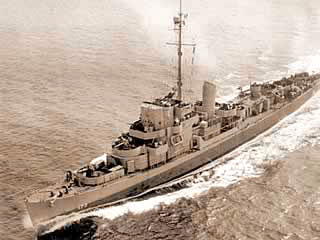
USS Eldridge:
Was the DE-173 part of an accidental teleportation &
invisibility project? |
The real story behind the
Philadelphia Experiment may never be known, and the primary
sources of information about it come primarily from a merchant
Marine sailor named Carl Allen (a.k.a. Carlos Allende),
as well as an anonymous source known only under the pseudonym ‘Dr.
Franklin Reno’.
Author William Moore interviewed
both Reno and Allende during research for his book “The
Philadelphia Experiment”—while both men offer different
perspectives on the experiment, they agree in principle of a variety
of key points.
The original story about the Philadelphia Experiment surfaced
in the form of three letters from Carlos Allende (later known
to be Carl Allen), sent to a Dr. Morris K. Jessup
after the 1955 publication of Jessup’s book entitled, “The Case
for the UFO”.
The rambling, often incoherent writing
in the letters described an experiment with the purported goal of
making a ship invisible to radar – but in Allende’s words,
the ship suffered a mysterious accident, rendering it temporarily
invisible but having horrible biological side effects on the ship’s
crew.
Carlos Allende claimed to have seen this experiment
from his post on a nearby observational Liberty ship, “The S.S.
Furuseth”, positioned in Philadelphia Harbor.
Dr. Franklin Reno, who apparently had been in hiding for
several years when Moore finally interviewed him, claimed that his
role had been as an assistant to a Dr. Albrecht and ostensibly also
to Dr. Von Neumann on some of the mathematical calculations
required to vet the physics for government buyoff on the project.
Reno described to Moore performing calculations for a 10%
deflection in light, and also mentions working to some degree with
Einstein’s Unified Field Theory, which reinforces the idea
that the Philadelphia Experiment was performed with the
intent of making the USS Eldridge invisible to both radar and
visible light. In effect, Reno described a real-life “Mirage
Effect” nearly identical to the fictional invisibility device later
portrayed in the 1987 science-fiction movie “Predator”.
One of the real problems with regard to the Philadelphia
Experiment story has been the amount of mythology
surrounding it. In many ways, it serves as a modern-day extension of
the many “ghost ship” tales such as the story of the Flying Dutchman
from earlier eras.
Different retellings of the Philadelphia
Experiment tale always seem to contain a unique twist – in some
stories, the experiment was meant only to produce radar-invisibility
to provide the Navy with a means of avoiding enemy radar while
traveling in convoys.
Radar was still a very new and emerging technology in 1943,
and one of the chief complaints about the ‘radar-invisibility’
explanation for the Philadelphia Experiment is quite simply
that German radar had not yet become a major problem for the Allies.
However, another retelling of the story offers an interesting twist
to this “cloaking device” theory, in the form of making
the Eldridge literally invisible to the naked eye.
This alternative claim is that German battleships used very
precise optical sights on the top of tall masts for “over the
horizon” range finding, and that by creating a mirage effect around
the hull of the Allied ships, it would limit the German’s ability to
accurately gauge the distance and elevation for their battleship
cannons.
This “mirage effect” has been supposed to come from
different possible sources – one idea is that it was accidentally
discovered as a by-product of high-frequency resonant coil
devices found by
Tesla during earlier research.
|
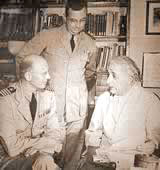
Albert Einstein:
Worked for the Navy during WWII. |
Another possibility is that Einstein himself invented the
“mirage effect” in 1943, during a consultancy period in which he
worked for the US Department of the Navy
by the appointment of Dr. Vannevar Bush. Einstein’s FBI file
places him in the right place at the right time – working for the
Navy’s Bureau of Ordinance on what was officially described as “a
device to explode a torpedo under a ship”.
This has been presumed to suggest that
Einstein at least participated in the Philadelphia Experiment,
as his skills would have otherwise been far more valuable to
something like the Manhattan Project than a simple exercise
in mechanical engineering.
The exact goals of the Philadelphia Experiment aren’t known,
and could even have been as mundane as finding a way for the Allies
to create EM interference with torpedoes and mines of the day
– however, what is known about the experiment is that the results
were far from what were anticipated.
By cross-correlating stories from a number of sources, we can
ascertain that the core-theme of these tales revolves around
|
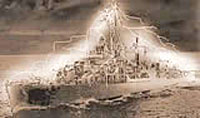
Invisibility:
Reports claim that only a ship-sized hole in the water
remained. |
the USS Eldridge disappearing at
port in Philadelphia Harbor in a fog of “green mist”. Supposedly,
the ship faded from view, until the entire ship itself was
eventually invisible – leaving in its place only a ship-sized hole
in the water to indicate that it was still present.
A neat trick, to
be sure, but the side effects tell the more interesting story…
In addition to bending light around itself, the USS Eldridge
seems to have experienced a number of intense anomalistic effects,
including teleportation and/or time-displacement.
It’s
difficult to confirm most of these, but they include men melting
into the decks of the ship, and a rumor persists that in addition to
causing insanity in many of the crewmen, the crew also carried
residual field-effects within themselves: a brawl was reported the
night after the test had been conducted with a report that two of
the crew members had literally vanished into thin air in front of a
waitress.
The reported side-effects of the
Philadelphia Experiment were
are too diverse to completely describe in this overview, and its
difficult to tell which effects really occurred and which are the
product of wishful thinking.
As it turns out, the world would be
forced to wait nearly 40 years for any kind of validation about the
Philadelphia Experiment …
Part III. An
Accidental Replication?
The connection between the Nazi Bell & Rhine Valley experiments
and the Allied Philadelphia Experiment of World War II may
quite possibly come from a very unexpected source – a Canadian
inventor by the name of
John Hutchison.
Hutchison is a rather unique character – he collects and
tinkers with a variety of electronic gadgets at a small apartment
that he’s converted into a laboratory in Vancouver, BC. In addition
to a collection of Tesla Coils and Van De Graaf generators,
he
|
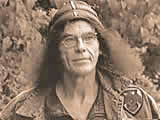
John Hutchison:
The Canadian inventor who discovered the H-Effect. |
also has several RF-amplifiers and an
assortment of surplus Naval electronics equipment that he’s
purchased from auctions at the nearby shipyards.
What makes Hutchison unique is
that he has an eye for putting things together, and has been able to
produce some rather spectacular effects simply through adjusting his
equipment correctly.
Hutchison seems to be the middle ground between the
Antigravity effects reported from the Nazi Bell experiments
and the melting-materials effects of the Philadelphia
experiment. His experimentation with high-voltage and
high-frequency apparatus has produced effects ranging from
antigravity and levitation in a variety of materials, to
the melting and jellification of materials – including substances
melting into each other at room temperature.
The effects range in scope and scale quite profoundly – in some
occurrences the levitation only lifts a few grams, while in
|
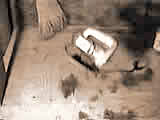
Levitation: The
H-Effect can levitate objects up to several hundred pounds. |
another instance a several hundred pound
cannon ball was captured on tape hovering in mid-air.
Hutchison has collected an abundance of evidence to support
his research – including hours of video and reels of film, as well
as deformed samples of metals subjected to room-temperature melting
and jellification, and enough other supporting evidence to convince
even the most jaded skeptic that these effects do indeed occur as
they’ve been described.
Hutchison has further backed his story by allowing
independent scientific teams to examine these effects as they happen
– including at one point a 6-month study conducted by a CIA
research time financed by
Col. John Alexander, which
supported the veracity of his unusual experiments, but were unable
to explain the basis for the Hutchison Effect.
Hutchison himself does not work in a theory-based environment
– his research, for whatever the reason, evolved in a hands-on
setting, which means that he understands how to establish the
environment that creates the effects that he’s achieved, but these
effects are nonetheless largely random and difficult to predict.
Hutchison spends most of his time tinkering, and the biggest
challenge remains a fundamental understanding of why and how he’s
able to do what he does.
The scope and complexity of John Hutchison’s work is vast
enough that a number of researchers have speculated on its
application to a variety of alternative-
|
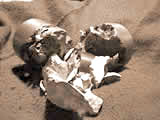
Anomalies: This
steel ingot was crushed into powder from the H-Effect. |
science concepts and
disciplines. In this particular case, however, it is the correlation
of the effects and side effects of the
Hutchison Effect with the Nazi Bell experiments and the
Philadelphia Experiment that is of the greatest interest.
Hutchison’s work, which has been well recorded and extensively
documented, seems to provide validation for both of these World War
II era experiments, despite their inherent lack of validating
evidence.
Hutchison’s work seems more closely
related to the Philadelphia Experiment in practice than it
does to the Nazi Bell experiments – after all, both the
H-Effect and Philadelphia experiment seem to have
utilized high-power Tesla equipment, such as resonant coils
and rotating fields.
Neither of those experiments seems to have
utilized mechanical rotation to any degree, whereas the Nazi Bell
seems to have been designed specifically to enhance these effects.
There’s a final factor that makes Hutchison’s work especially
notable: his experiments don’t produce negative biological side
effects. This may be the result of the higher-frequencies that
Hutchison uses experimentally – the H-Effect occurs between
10 to 20 megahertz, instead of working in the kilohertz
range like the Bell Device, or the 10 – 125 Hz range that
Corum suggested for the Philadelphia Experiment.
Do the higher-frequencies make his device more efficient, or simply
put the field-effects out of the range that damages living
organisms?
Part IV. John
Dering’s Speculation on the Nazi Bell
One of the lessons that the World War II era experimentation with
Einstein’s Unified Field Theory teaches us is that these forces
can be hazardous or downright dangerous if a careless or hasty
approach is taken in developing them.
The crew of the USS
Eldridge appears to be representative of the biological hazards
that have become apparent, and it has been claimed that
experimentation with the Nazi Bell also caused human
casualties.
Risks and hazards aren’t new to the process of scientific
discovery - many new technologies carry with them dangerous risks if
not handled with care, and over the last few years several private
organizations and individual researchers have begun a cautious
exploration of these effects with an eye to developing a better
understanding of how to harness this technology while minimizing
potential health concerns.
John Dering is one of the primary advocates of renewed
support in experimentation with Einstein’s Unified Field Theory
and several other related approaches to Antigravity and
new-propulsion concepts. Dering works at SARA Inc, a
California aerospace & defense contractor involved with a variety of
development projects based on breakthrough innovations in
technology.
Dering is the first to acknowledge that this approach to
technology carries risks – he’s commonly used the phrase
“when you pull the cat’s tail you get the whole cat”, by which he
means that since the Unified Field Theory taps into multiple
forces by warping the space-time manifold, tampering with
a single force such as gravity will undoubtedly have
side-effects that show up in unrelated forces as well.
Dering’s concern for the biological risks associated with UFT
research is echoed by Nick Cook’s description of the
Nazi-Bell experiment,
“During the tests, the scientists
placed various types of plants, animals, and animal tissues
within the Bell’s sphere of influence. In the initial test
period of November to December 1944, almost all of the samples
were destroyed. A crystalline substance formed within the
tissues, destroying them from the inside; liquids, including
blood, gelled and separated into clearly distilled fractions.”
Cook further described the human
cost associated with these experiments,
“People exposed to the program
complained of ailments, in spite of their protective clothing.
These ranged from sleep problems, loss of memory and balance,
muscle spasms and a permanent and unpleasant metallic taste
in the mouth.”
Are the reports of these negative side
effects inherent to the Unified Field Theory itself, or do
were they merely the result of a flaw in the Bell’s design?
Cook
seems to suggest that the Germans had made considerable progress
towards eliminating these side effects altogether through
modifications made to the Bell during testing,
“In a second series of experiments
that started in January 1945, the damage to test-subjects was
reduced to around 12-15 percent following certain modifications
to the equipment. This was reduced even further to two to three
percent following a second set of refinements.”
One thing that has become apparent is
that whatever side effects may occur are difficult to shield
against – they seem to manifest in unexpected ways, and at low power
levels they appear not as biological effects but instead as an RF-interference
with measuring equipment.
Dering claims that as these
experiments begin to tap into the force of gravity they create a
“back-EMF” effect, which he explains as being gravitationally
induced electromagnetic fields that are impossible to shield against
using current technology.
What is the magnitude of these back-EMF effects in an
experimental setting?
“The AG experiments I have done
produced a complicated field,” writes Dering, “A torsion
field induced by a rotating EM (electromagnetic) wave creates
the curvature. The problem is that these fields are
manifestations of the underlying unified fields that manifest as
the five modes we call the fundamental forces.”
“To induce torsion and make curvature the system is
driven at several RF (radio frequency) frequencies
with the appropriate modulation—there are lots of time
derivatives flying around. The result is that the time varying
AG (antigravity) field back induces an EM field
that attempts to react against the input pump wave… and that
back EM is intense, too! And there are those bloody cross terms
this component linked to that one… what a soup.”
We measured minor effects with the
gravitational rotor test of the Unified Field relations - but it
takes real power, at or above a critical intensity and field
strength for at least a minimum amount of time (the nonlinear build
up time constant) for powerful AG effects to manifest.
This
may have to be done with very good control on pump frequency
bandwidth and phase. Minor weight reduction I have already seen and
done, we did that in 1993-94. It turns out we were probably
reproducing the same sort of experiments that Gerlach and
others propped in the late 1920’s early 1930’s. Even then it took a
while before the threshold dependence of this type of interaction
was appreciated.
That in a nutshell is what went “wrong” with the US Navy tests. The
small-scale stuff showed a reduction in RCS due to an easily
predicted linear electrodynamics effect of a magnetically biased
ferrite material. When they scaled up to a ship class test and added
the power to create the same field intensity (for something as big
as a DE class ship)… then they unknowingly crossed a
nonlinear threshold and “all hell broke loose”. It was not obvious
what had happened.
So have some people seen AG effects? Yes. Whey are these
effects so difficult to predictably reproduce? Because it requires
meeting all of the conditions I mentioned above. If you are at or
just past threshold the effect will drift in and out as the system
drifts slightly through the right amplitude, power, frequency and
phase conditions. Just as nonlinear optical effects driven by a
laser right at threshold intensities will flicker as the beam and
media drift in and out of critical phase matching.
In Dering’s view, the key factor to making Antigravity
a reality using the Unified Field Theory comes down primarily
to issues of scale & intensity. The idea seems to involve crossing a
minimum threshold for the effects to begin occurring, which ties
into the concept of these effects being non-linear in scale.
In
essence, at low-power nothing can be observed to happen – but as
power is increased various effects begin to appear, beginning first
with the unshieldable back-EM effects and progressing at
higher-power levels to Antigravity and perhaps other effects.
“The Nazi Bell device
consisted two of counter-rotating cylindrical containers. The
containers, which were positioned one above the other measured
approximately 1-meter diameter, and were filled with
cryogenically cooled and frozen Mercury metal. There was a
frozen core of a metallic paste, which served as a “high
permeability material” for the EMG
(electromagnetic-gravitational) field.”
In comparison to the Nazi-Bell design,
Dering describes the Rhine Valley experiment as being
considerably more straightforward,
“The other large device was
mechanically more simple but more elegant in the applied physics
and engineering. This was a static device that used a rotating
RF wave [not rotating magnetic field but an actual rotating
wave*].”
Conceptually, the description of
rotation in the Bell device connects with idea of torsion
fields being used to create a shear-effect on the time-space
manifold surrounding the Bell. The exact nature of this is poorly
understood, but the crux of the idea involves modifying the
background properties of time and space in the local vicinity of the
device, which may serve to create a propulsive Antigravity
Effect.
Additional speculation has surfaced that one of the primary reasons
for the hemispherical Bell shape in the Nazi design was to create a
gravitational reduction from a non-zero divergence of currents over
a planar surface. Support for this idea comes from the work of
Dr. Pharis E. Williams, a Professor at New Mexico Technical
Institute, who has independently created a Unified Field
Theory based entirely on Thermodynamic Principles that he
calls the “Dynamic Theory”. Williams’ research predicts that
a diverging current may lead to a significant reduction in
gravitational force.
Part V. Corum
Reverse-Engineers the Philadelphia Experiment
While John Dering has speculated about torsion fields arising
from rotating RF-waves circulating through frozen Mercury in the
Nazi Experiments, another proposal for implementing Einstein’s
Unified Field Theory has been proposed by Dr. James Corum,
a PhD in Electrical Engineering with expertise in the historical
work of
Nikola Tesla.
Dr. Corum is a highly regarded engineer with a history
includes work for the National Security Agency (NSA),
a faculty teaching position at Ohio Institute of Technology, and a
more recent position as the chief scientist for the Institute for
Scientific Research (ISR) in West Virginia. He’s a prolific
writer, and has authored over 100 papers on a variety of scientific
topics– including a complete a translation of 1929 Einstein’s
Unified Field Theory from German to English, where he first
became aware of the gravitational coupling that Einstein had
predicted.
In 1994, Corum was a primary contributor to a 94-page
treatise describing just such an experiment, entitled, “Tesla’s Egg
of Columbus, Radar Stealth, the
|
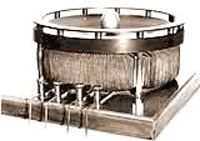
Tesla’s Egg:
Basis for the Mirage Effect experiment? |
Torsion Tensor, and the Philadelphia
Experiment.”
As the title suggests, the focus of the paper was on examining Tesla’s reported
contribution to the 1943 experiment, in the context of his earlier
historical analysis of Tesla’s Egg – an experiment
demonstrated at the 1905 World’s Fair in which a copper-clad egg is
made to stand on end through inductive rotation in an AC magnetic
field.
The paper itself is sold through Arcs ‘N Sparks – a Tesla
historical society that Corum participated in during the
early 1990’s.
Their description of the paper’s contents is not
complete, but does offer some insight into the paper’s content:
“By calculation, the magnetic field
required to reduce a ship’s radar reflection to less than 1
percent at L-Band (1.5) GHz is in excess of 15,0000 A/m.
Fields
of this magnitude would appear to fulfill the requirements of a
“Philadelphia Experiment” by creating green mist and
cavities in salt water as well as magnetophosphenes and
Purkinje patterns in humans, particularly if driven at
frequencies in the range of 10-125 Hz, as was available
from synchronous generators on WW-II electric-drive ships.”
James Corum has described the
paper as being the result of a light-hearted conversation
speculating about whether Carlos Allende’s description of the
Philadelphia Experiment could be accurate based on what was
known about the experiment and the scientists contributing to its
development.
The paper emerged as a challenge in reverse engineering
that includes both Einstein’s Unified Field Theory, as well
as a description of the hands-on development of large-scale
degaussing coils & rotating-waveform modified by Tesla to provide a
massive, rotating RF-field surrounding the ship.
While Corum acknowledges Franklin Reno’s statement
that the Philadelphia Experiment was attempting a 10%
deflection of light to create a mirage effect, he also
addressed speculation about radar-invisibility component of
the experiment:
“During the war, the Germans had a
radar-reduction program underway to reduce the radar-cross
section of a ship based on the concept of impedance matching. It
was known that magnetic biasing of an iron or steel medium can
control the surface impendence, and the use of degaussing coils
to achieve this is likely due to heavy experimentation with them
during the war to reduce naval ship’s susceptibility to attack
by magnetically detonated mines or torpedoes.”
|
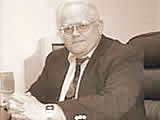
James Corum:
Reverse-Engineered the Experiment |
Corum elaborated on this,
suggesting that impedance matching by on the hull of the USS
Eldridge could have been part of an Allied attempt at a competitive
impendence-matching “stealth” program for avoiding German radar, and
that the magnetic fields required to achieve this would have been
powerful enough to actually liberate chlorine gas from
surrounding salt-water, which would produce the “green mist”
that Carlos Allende describes.
Corum has taken the speculation even farther, however,
suggesting that the “teleportation effect” that many people
have described during the Philadelphia Experiment may have been
similar in nature to later experimentation with photon-gyroscopes.
In essence, the question becomes whether the high-intensity,
rotating magnetic fields could have in fact created a profound “time
effect” through rotating frames of reference that effect that
local space-time manifold.
Part VI.
Gabriel Kron’s Contribution
Dr. James Corum’s research into the Philadelphia
Experiment found evidence to connect Einstein’s Unified Field
Theory with the experiment in a very direct sense in the form of
Gabriel Kron, an electrical engineer who had written
extensively on the kind of synchronous electrical machinery in AC
motors and magnetic field equipment.
Kron was born in Hungary
in 1901, and immigrated to the United States in 1921, where he was
briefly enrolled at the University of Michigan before dropping out
to pursue a personal quest for enlightenment.
Electrical Engineer Jack Casazza has provided an excellent
history on Kron’s life, which can be summarized in the following
quote:
“He was thrown out of the University
of Michigan because he was always fighting with the instructors,
at something like sixteen. He decided to work his way around the
world, and came to Hollywood. He was very brilliant. He had so
many problems because his professors were a couple of light
years behind him. He got back to Hollywood, signed a contract
for $10,000 or so to work on his new experimental movie
camera, and the company that gave him the contract paid him
the money up front and went bankrupt.
So he had a year or two with no work
to do. He came to New York City. In the public library he
started to read books on mathematics and became the inventor of
something called tensor analysis. It became quite
important but then he worked for GE. He was unusual and was not
easy to work with because he was ahead of his time. You have to
mention him in the history of electrical engineering because he
was a character....”
John Dering has also commented on
Gabriel Kron, stating,
“Kron provides—if nothing else—the
experimental verification of Einstein’s Unified Field.
Kron shows that certain anomalies in synchronous machines can
not be accounted for by any physical description except the
Unified Field equations.”
It makes sense that both Dering
and Corum support Kron’s research, as they had the
opportunity to compare notes on this research while they worked
together at SARA, Inc in 1997. Corum has since gone on to work as
the Chief Scientist at the Institute of Scientific Research
in Kentucky.
|
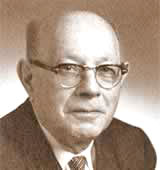
Gabriel Kron:
Scientist and Electrical Engineer. |
What makes Kron’s work so valuable in analyzing the
Philadelphia Experiment is that Kron developed a method of
tensor analysis for use in practical electrical engineering – a
method that could be rigorously applied to electrical systems on a
practical level that could be used by engineers.
In fact, Kron even went a step
further – in the analysis of complex synchronous electrical systems,
he postulated that the only method by which some of them could be
explained was through the use of Einstein’s Unified Field Theory,
which suggests that the elements for the Philadelphia Experiment
and perhaps even
Nazi Bell technology are lie dormant at some
level in even common household electrical equipment.
This connection between Kron’s work and Einstein’s Unified Field
Theory forms the basis for a real connection between the degaussing
coils that Tesla presumably modified for use on the USS
Eldridge and the reported mysterious effects that occurred
during the experiment.
“The scientists on the
Philadelphia Experiment would have also been familiar with
Gabriel Kron’s work,” says Corum, “It had been around
since the 1920’s, and had been taught in GE’s advanced
engineering school, as it has a variety of applications to
solving problems that occur across multiply-connected electrical
systems, such as the North American power-grid.”
Through Kron’s work, Corum
is able to describe vacuum-manifold manipulation of space-time,
but more importantly, to provide some insight into how it can be
engineered for future applications, including potentially
Antigravity and space flight.
When reached for comment on whether Kron’s theories would be useful for engineering future Antigravity
technologies, James Corum responded,
“Absolutely. Gabriel Kron was the
first engineer to use geometric models to solve
electromechanical problems.”
Part VII. The End of
the Beginning
Albert ‘s Theory of Relativity, published in 1915, is one of
the most famous ideas in the history of science, referenced in
nearly every scientific textbook ever published, even at the
elementary school level.
Books, magazine articles, lectures, and
television shows have all been created to showcase this theory and
explain its application to the public. Why is it that the Theory
of Relativity receives all of the attention and
Einstein’s later Unified Field Theory receives almost none,
despite Einstein contributing over 30 years to developing it?
With the detonation of the world’s first atomic bomb at Alamogordo,
Robert Oppenheimer became “Death” – but Einstein
became famous, because his theory of relativity made the atom bomb
possible.
The atom bomb was in turn an enormous validation for the
Theory of Relativity, which had shown the unification of mass
and energy.
-
Is this the reason why Einstein’s
Unified Field Theory, which unifies
electromagnetism and gravity, is still obscure?
-
Is it because there hasn’t been a
grand experiment to confirm his work?
-
Or has there been?
-
Is it possible that in the
Philadelphia Experiment was a successful confirmation of this
theory in 1943, and the Nazi Bell validated these results even
further in secret German testing in 1944?
-
Is it possible that the
Hutchison Effect is an even
further validation for Einstein’s work – containing documented
experimental validation for claims from both the Allied and
German research?
William Moore, writing in “The
Philadelphia Experiment”, suggests that Einstein had ethical
qualms about the initial release of the Unified Field Theory in the
1920’s – but later resurrected the idea for its application after
he’d committed himself to the war effort of World War II.
While
Einstein claimed in public that he never felt comfortable that
his Unified Field Theory was complete, modern scientists such
as John Dering have suggested that it was complete enough to
provide an engineering-level roadmap for manipulating gravity with
electromagnetic forces.
Dr. Pharis Williams has created the “Dynamic Theory”
that seems to derive the equations for both the Theory of Relativity
and an experiment for gravitational reduction that looks
suspiciously similar to the Nazi-Rhine Valley work – is this an
independent confirmation that Einstein was on the right track
with his research, and was simply waiting for a more peaceful age to
make it public?
Einstein was a pacifist at heart, yet lived through two of
the greatest wars in the history of mankind – only to spend the
remainder of his life in the middle of the Cold War, where both
sides were pursuing the ultimate scientific and technological
advantage to initiate a crippling “first strike”.
The book has yet to be written on the real applications for
Einstein’s Unified Field Theory – it appears to have profound
implications into Antigravity and transportation
technology, and may even open the door for travel to other
star-systems or even dimensions. While we may not live in the
peaceful age that Einstein may have envisioned, we do have
pressing needs with peaceful goals that this theory may be the key
to solving, and the ethical pursuit of his dream may lead us closer
to the age of peace that we all dream about.
Like all great stories, the tale of Einstein’s Unified Field
Theory and its connection to the Philadelphia Experiment
and Nazi Bell & Rhine-Valley experiments raises more
questions than it answers – but it also does something more.
It
begins to give us the real glimmer of hope that a solution for the
key to transportation in the 21st century may have been
found by one of the greatest scientists in history… Albert
Einstein.
Part VIII.
Afterward
The consensus opinion seems to be that while Einstein’s Unified
Field Theory isn’t a perfect tool for engineering Antigravity devices, it does provide a good theoretical foundation to
support future research & rapidly develop new technologies.
While
the WW-II era examples cited in this paper are directly based on the
application of Einstein’s UFT, the theory itself is broad enough to
potentially explain a number of anomalous physics results.
Dr. James Corum has indicated that Einstein’s post-1929
versions of the theory contain the cross-linking information to
support AG experimentation. In addition to Einstein’s work, Corum
has compiled a collection of related theoretical work that he
believes both supports and extends Einstein’s vision – these
documents may see the light of day in the near future, as Corum is
seeking publication for both his translation and the related
materials in book form.
John Dering is currently conducting experimentation based on
the examples of the Nazi Bell device, Rhine Valley
experiments, and Philadelphia Experiment. In addition to
experimentation with the ideas that he’s assembled, John has been
working on computer-modeling applications to better illustrate the
relationships that occur in Unified Field Theory physics. His
hope is not only to provide definitive evidence to validate
Einstein’s vision, but also to work towards creating engineering
tools for the technology of tomorrow: Antigravity
Nick Cook has continued his research into the Nazi Bell
device, and continues to find new leads on the story that he
plans to address in future publications. Since the publication of “The
Hunt for Zero Point” in 2001, he’s traveled to visit the
Wenceslas-Mine again – this time to collect test-samples for further
experimentation, and to corroborate the vast amount of evidence that
he’s uncovered from other sources.
The material contained in this story is compelling enough that even
during the course of writing the story, several of the author’s
colleagues have become interested enough in the subject material
that they are beginning serious research on Kron &
Einstein with an eye for understanding gravitational phenomenon
as part of a much larger schema in physics.
While Einstein’s dream of peace remains illusive on a global scale,
the spirit of international and scientific collaboration has
generated tremendous results for assembling the diverse knowledge on
this subject to facilitate future research.
It is hopeful that this
spirit of friendly cooperation remains true to Einstein’s vision,
and leads to the perfection of his final masterpiece in a real-world
scientific breakthrough – Einstein’s Antigravity.
Part IX.
References
-
“The Hunt for Zero Point”, Nick
Cook, Random House, 2002
http://www.randomhouse.co.uk/minisites/zeropoint/index.html
-
“The Philadelphia Experiment”
William Moore & Charles Berlitz, 1979
-
“Tesla’s Egg of Columbus, Radar
Stealth, the Torsion Tensor, and the Philadelphia
Experiment,” by K. L. Corum, J. F. Corum, Ph.D., and J. F.
X. Daum, Ph.D., 1994. 94 pp. Illustrated.
http://www.arcsandsparks.com/teslapage.html
-
Einstein’s Unified Field Theory
(Online Translation for 1920’s publication, English and
German)
http://www.lrz-muenchen.de/~aunzicker/ae1930.html
-
Biographical Information on Hans
Kammler
http://www.balsi.de/Sonstiges/Personen/K -/Kammler-Hans.htm
-
Nazi Coanda-Effect UFO & Flying
Disk Experiments (Coanda & Epp only)
http //www.laesieworks.com/ifo/lib/WW2/Omega.html
http //www.laesieworks.com/ifo/lib/WW2/HenriCoanda.html
-
AvroCar Coanda UFO Design:
http://www.virtuallystrange.net/ufo/mufonontario/avro/avrocar.html
-
Walther Gerlach & the Nazi
Fission-Pile Research Program
http://www-personal.umich.edu/~sanders/214/other/handouts/ChronGer.html
-
The Hutchison Effect:
http://www.americanantigravity.com/hutchison.shtml
-
Pharis Williams (MIT) –
Diverging currents creating gravitational reduction Dynamic
Theory Overview:
http://www.nmt.edu/~pharis/
-
Williams’ Current Divergence
interaction with gravitational field (Chapter 8.5):
http://www.nmt.edu/~pharis/Dynamic/Chapter8.pdf
-
Gabriel Kron Historical
Information
http://www.quantum-chemistry-history.com/Kron_Dat/KronGabriel1.htm
-
Jack Casazza’s Oral-History
(IEEE Interview)
http://www.ieee.org/organizations/history_center/oral_histories/transcripts/casazza.html
Part VIII.
Acknowledgements
Special Thanks is due to John Dering,
for the story idea and connecting the pieces for me, Nick Cook
for the excellent research in “The Hunt For Zero Point”, James
Corum for wonderful background info about the Philadelphia
Experiment, Kron, etc, and Eric Davis for vetting this
information for general accuracy.
Additional thanks goes out to
Paul Murad, who inspired me to finally sit down and write this
one up, and Richard Hoagland for inspired insight into this
material and in-depth technical advice.
– Tim Ventura
|













